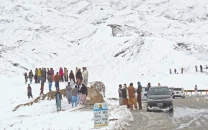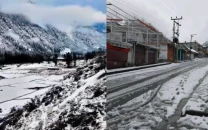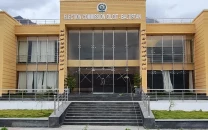Disasters aided by man: Darkut stands deserted as climate change fuels migration
Over years, flooding, landslides push over 100 families to leave village for safer areas

Globally averaged temperatures over both land and ocean surfaces between January and June of year 2015, were the hottest on record since 1880, said NOAA data. PHOTO: FILE
Darkut village once inhabited by nearly 330 families is almost deserted now. Signs of life have been replaced by a wasteland of boulder clay punctuated by ruined houses, rust shrubs and sharp trees.
Over 100 families left the village in recent years while many others are preparing to vacate the area in what has been termed the first ‘climate-induced migration’ in the region. Recurrent flooding and landslides have gradually altered the topography of Darkut and compelled many families to vacate this village in Yasin Valley of Gilgit-Baltistan’s Ghizer district.
Eye of the storm
Location has a major role to play in the mass departure of so many people. Situated 70 kilometres away from Gilgit amid the Hindu Kush near the Pak-Afghan border, the village is surrounded by two glaciers – Kharigal glacier and Darkut glacier.
This 355 square kilometre village was first hit by floods in 2010 with devastating consequences. Over 200 people lost their lives and the area’s infrastructure was badly damaged. Over the next five years, Darkut was pummelled mercilessly by similar catastrophes. Houses, roads, irrigation channels, schools were all rebuilt to be torn down again. In 2015, according to Chief Minister Hafeezur Rahman, at least 17 people died in flood-related incidents and the region suffered a loss of Rs1.5 billion.
Read: Public health: ‘Climate change making diseases deadlier’
Time to say goodbye
Agro-pastoral living is the lifeblood of a majority of Darkut’s population. Residents grow wheat, potato and barley and rear breeds of livestock suited to the mountainous region.
Villagers believe natural catastrophes are a relatively new phenomenon and the situation has worsened with time.

“The village is no longer a suitable place to live,” Aslam Khan tells The Express Tribune. “Our ancestors lived here for centuries in peace; nothing of this sort happened before.” Until recently, Aslam had lived in Darkut. However, he was forced to bid farewell to his home and move to Hatoon, another village in Ghizer. At least 75 families have moved there as well, while 30 others have shifted to Gilgit in search of a less perilous existence.
“We lost everything – our homes, livestock, the trees and the fertile land which we lived off,” he says. “Surviving the seven-month long winter is difficult, what with floods becoming a regular feature that threatens our existence.”
No escape
At a time when most people have relocated, Bahadur Shah has stayed on, living under the threat of melting glaciers, because he does not have the means to leave Darkut. “If I am still alive and can afford it, I might be the next one to bid farewell to the village,” he says.
According to Bahadur, Focus Humanitarian Assistance, an NGO, provided relief goods during these disasters. He says the government failed to fulfil its responsibilities. “The government gave us bags of flour instead of compensating (us with money),” he added.
The scatter
As the villagers start their lives anew, a singular concern nags them: Who will buy the land they left behind?
“We want to sell our land,” says Farman Ali, another villager who migrated from Darkut. “But nobody is willing to buy it – even at throwaway prices.” According to Ali, displacement is always painful. “Not only do you leave behind your ancestral land, you also run the risk of losing your future.” Ali adds, “Maybe now our children will not have the opportunity to attain a good education.”
Muhammad Khadim, another migrant, misses the spirit of community that was kept alive by friends and loved ones living adjoining lives in the same village.
“In Darkut, we were all together,” he says. “But now we don’t even know how to find each other.”
Published in The Express Tribune, October 13th, 2015.


















COMMENTS
Comments are moderated and generally will be posted if they are on-topic and not abusive.
For more information, please see our Comments FAQ